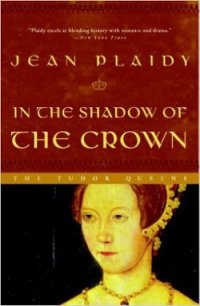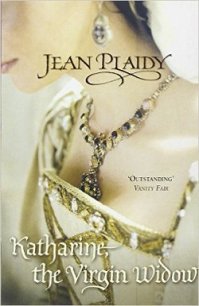The Sun in Splendour - Plaidy Jean (электронную книгу бесплатно без регистрации .txt) 📗
'He went through this form of marriage with her. She was his wife when he went through a form of marriage with Elizabeth Woodville. The Lady Eleanor went into a convent and I discovered that she died there in 1468.'
'So she died after he went through the form of marriage with Elizabeth Woodville.'
'Exactly, my lord. You see what this means?'
Tt means that Elizabeth Woodville was the King's mistress and the Prince now living in the Palace of the Tower is a bastard.'
'It means exactly that, my lord/
'My lord Bishop, you have shocked me deeply. I beg of you to say nothing of this to anyone . . . anyone whatsoever, do you hear?'
'I shall remain silent, my lord, until I have your permission to tell the truth.'
'I appreciate your coming to me.'
'I thought it was something which should be told.'
'It must be kept secret. I must ponder on this. I must decide whether or how it should be acted upon.'
'I understand, my lord, and I give you my word.'
'Thank you. Bishop. You have done right to tell me.'
When the Bishop had left Richard stared in front of him visualizing the prospect ahead of him.
Jane Shore was happier than she had been since the death of the King. It was a revelation to her that she was actually beginning to care about the man she had intended to dupe and who for years she had deeply resented. But Hastings was very different from that brash young man who had tried to abduct her. She had become an obsession with him over the years when he had watched her with the King and realized her qualities. Now he was finding that kindliness, that gentle wit, all her outstanding beauty was for him.
His friends laughed. Hastings has settled down, they said.
His wife, Katherine Neville, daughter of the Earl of Salisbury had long been indifferent to his philanderings. They had had three sons and a daughter so the marriage could be called successful after a fashion. They did not attempt to interfere with each other's way of life and Hastings had been closer to the King than to anyone else on earth. Edward had even said that when they died they should be buried side by side so that, good friends that they had always been in life—apart from that one occasion when the Woodvilles had sought to sow discord between them and had quickly discovered that it was useless—they should not be parted in death.
Jane talked to him a great deal about the Queen. She was rather sad about her; Hastings believed her conscience worried her. Had she wronged the Queen by taking her husband from her? Hastings laughed at that. Edward had had many mistresses and the fact that Jane had been his favourite had not harmed the Queen in any way.
The King was in the Palace of the Tower and no one whom he wished to see was prevented from seeing him—except his mother and his brother and sisters who were in Sanctuary. No one prevented them but what would have happened to them if they had emerged was uncertain.
He was delighted to see Hastings, knowing him as his father's best friend. He did know that his mother did not like Hastings but he had a vague idea that it was due to the fact that they went out a great deal together drinking and carousing with women. It was
understandable. But all the same Edward could not help being attracted by Hastings.
Hastings had a similar charm to that of the late King. He was good-looking, easy to talk to and made a young King who was not very sure of himself feel absolutely comfortable in his presence. He was very different from his Uncle Gloucester who was so serious always and made him feel at a disadvantage. Mistress Jane Shore visited him too. No one stopped her and he had always liked Jane. She was always so merry and at the same time she seemed to understand that he grew tired quickly and that when his gums bled and his teeth hurt he was a little irritable.
Jane would say: 'Oh it's those old gums again is it. Not really our King who scowls at me?'
She understood that he didn't want to be miserable but he couldn't help it; and that made him feel a great deal better.
'I wish I could see my mother/ he said. 'I wish she would come here. Why does she have to hide herself away?'
'I could go and see her in the Sanctuary and tell her you want to see her.'
'Would you, Jane?'
'But of course. There is nothing to stop my visiting her.'
'I am the King. I should be the one to say who goes where.'
'You will in time.'
'Anyone would think my uncle Richard was the King. I wish my brother Richard would come here. We could play together and I wouldn't be so lonely.'
'I will go to Sanctuary and tell them what you say,' Jane promised him.
Later she talked to Hastings about the sadness of the little King. 'Poor child, for he is nothing more, to be there in the Tower with all that ceremony! I don't think he enjoys his kingship very much. He would rather be with his family. I know you don't like the Woodvilles, William, but they are devoted to each other.'
Hastings was thoughtful. He did not like the Woodvilles. They had always been his enemies and particularly so since Edward had bestowed the Captaincy of Calais upon him. If they could have done so they would have destroyed him. He had supported Gloucester because he was so strongly against the Woodvilles, and he had thought he would be Gloucester's right-hand man as he had been Edward's. But Buckingham had arrived— Buckingham who had never done anything before this day. And
now here he was firmly beside the Protector so that everyone else was relegated to the background.
Hastings was turning more and more against Gloucester with every day. Perhaps Jane had something to do with this. She liked the Woodvilles; she had this ridiculous notion that she owed something to the Queen because she had taken her husband. The Woodvilles were powerful even though Rivers and Richard Grey were in prison, Dorset in exile and the Queen and her family in Sanctuary.
Then it began to dawn on Hastings—with a little prompting from Jane—that as by siding with Gloucester against them he had promoted Gloucester, so perhaps he could relegate Gloucester to a secondary place by supporting the Woodvilles. His visits to the young King showed him clearly where the boy's sympathies lay. The King wanted to be with his family; he trusted his family; he had been brought up by Woodvilles to believe in their greatness and goodness and he had learned his lessons well. Any who wanted to be friends with the King would have to be friends with the Woodvilles.
This last decided Hastings. He had finished with Gloucester who had taken Buckingham so strongly to his side so that there was room for no one else, although but for him the King would have been crowned before Gloucester even knew of his brother's death. Very well, he would turn to the Woodvilles. He would feel his way with them and the first thing would be to let the Queen know of his change of heart.
Tf I went to the Sanctuary it would be noticed at once,' said Hastings. 'Gloucester would hear of it and I should be under arrest in no time.'
'I have promised the King that I will visit his mother,' said Jane. 'Why should I not take some communication from you?'
So it was arranged, and Jane Shore paid frequent visits to the Sanctuary.
Elizabeth was delighted to see her, to have news of the King, and to receive the information that Hastings was turning away from Gloucester and was ready to side with her and her family, filled her with hope.
William Catesby was talking earnestly to the Duke of
Gloucester. Richard trusted Catesby; there was a sincerity about the man which he had noticed from the first; he was well versed in the law and could offer useful advice on that subject. It was men such as Catesby and Ratcliffe that Richard liked to gather about him.




